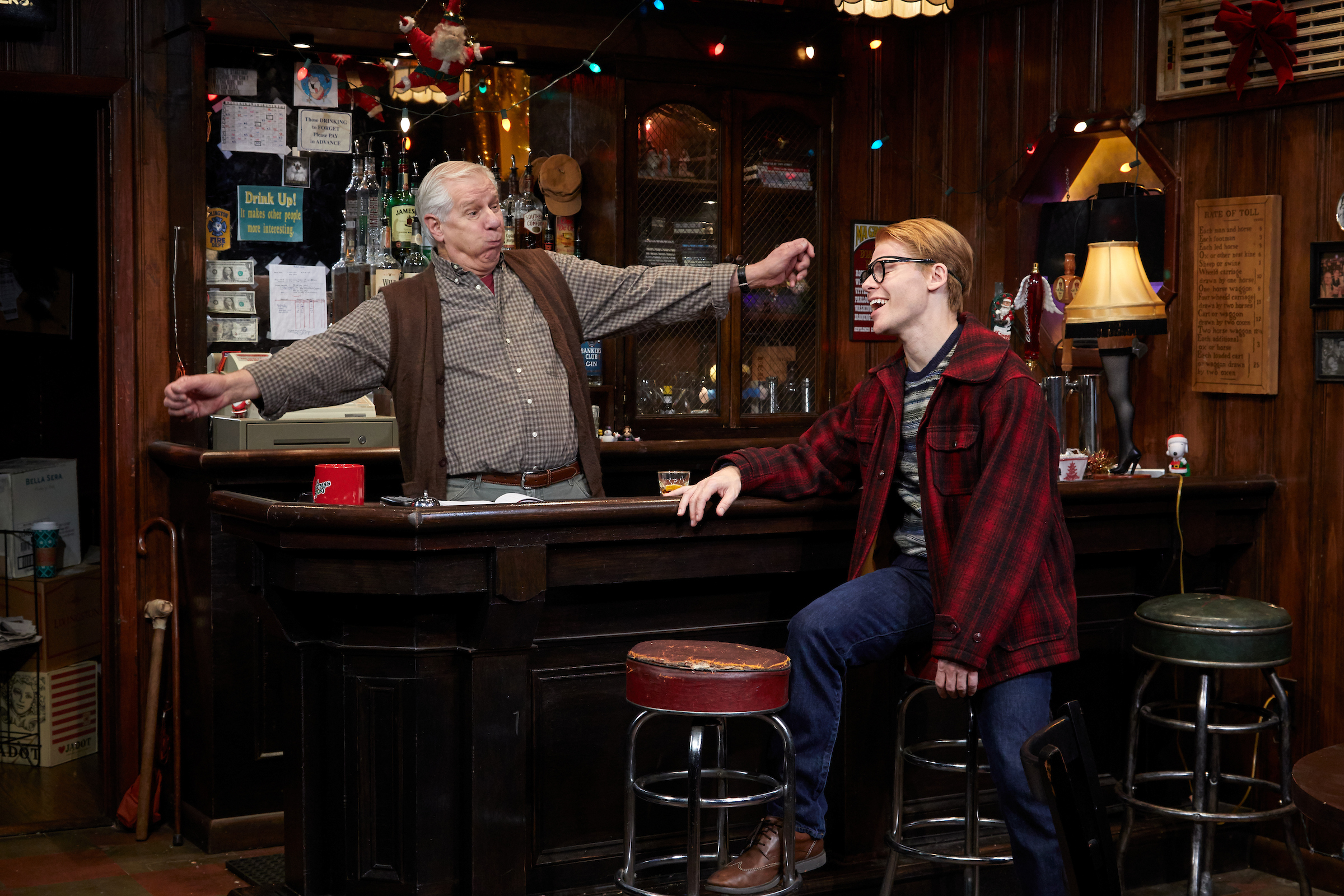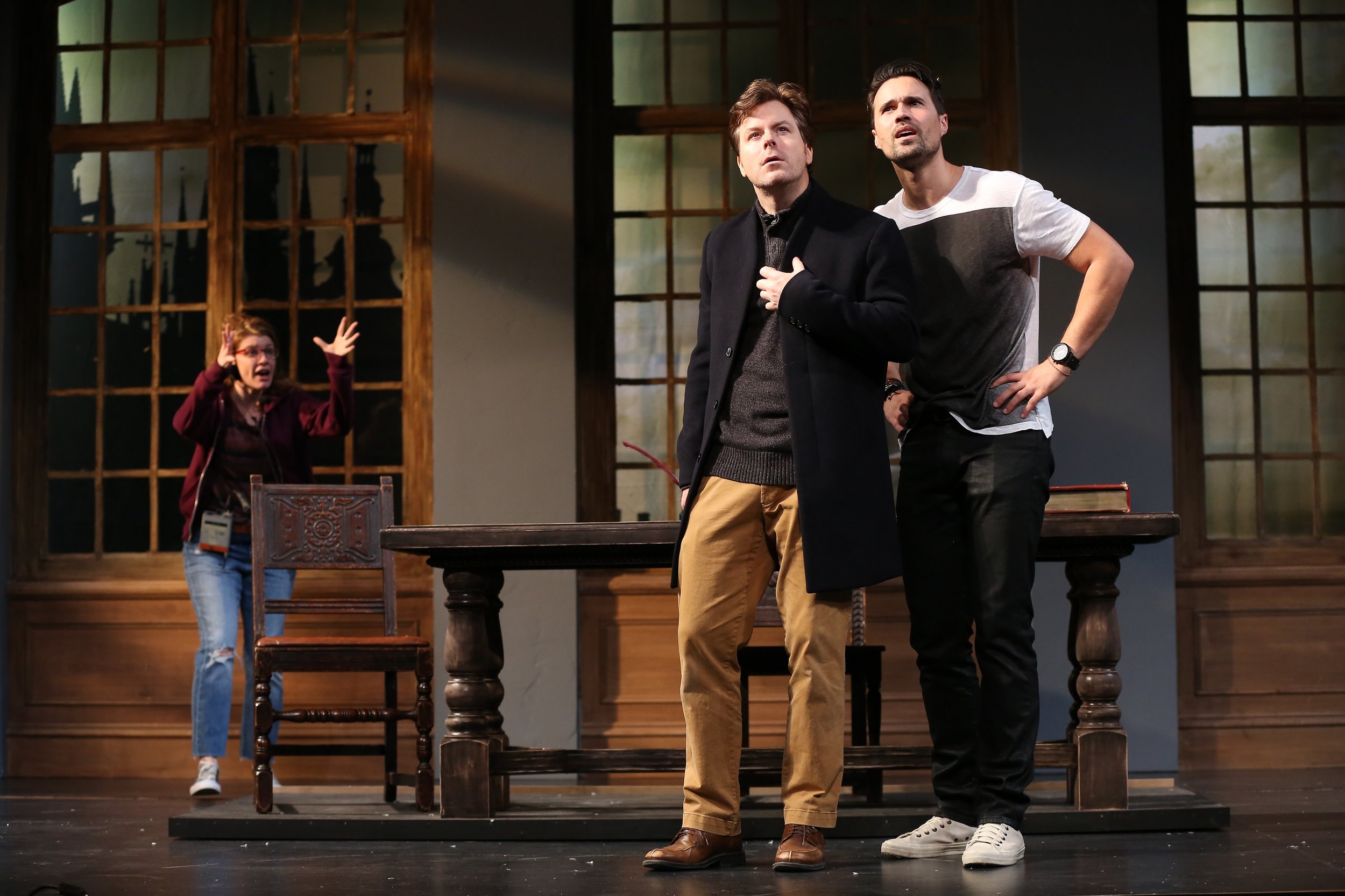Review of Christmas on the Rocks, TheaterWorks
What are some of your favorite memories of the Christmas holidays? If the list includes such things as the black boot of Santa waving in the face of a young boy before he plummets down a slide at a department store North Pole, or a cartoon boy with a blanket intoning words about the true meaning of Christmas, or the beleaguered manager of a Saving and Loan fixing to jump off a bridge into icy waters, or a sickly boy enlivened by “the pudding singing in the copper,” or a young girl accosted by giant mice, or a cartoon snowman cavorting as the “baddest belly-whopper in the business,” or a distraught young reindeer facing cruel taunts due to his beaming nose, then TheaterWorks has the show for you.
With Christmas on the Rocks, director Rob Ruggiero has brought together different playwrights to create dialogues for characters from Christmas classics. This year, the list entails A Christmas Story, It’s a Wonderful Life, Rudolph the Red-Nosed Reindeer, Frosty the Snowman, A Christmas Carol, and A Charlie Brown Christmas. For many of us, Christmas has taken its tone from such entertainments for as long as we can remember. So, we might ask ourselves, how would those familiar characters experience Christmas now, in 2018?
The show’s title “on the rocks” is apropos. Not only have the holidays become rocky terrain—which they pretty much were even in the original stories—but the entire action of the play takes place in a cozy little corner bar, presided over by Tom Bloom as the bartender. If the setting and the pace of featured character actor skits doesn’t bring to your mind Art Carney as the barkeep on the Jackie Gleason Show, then you’re probably younger than I am. The shtick is familiar, the exchanges between each guest and the barkeep anything but.
The jokes tend to assume familiarity with the shows from which these characters originate, which is fair enough. Playing off to the side on big screens, before the play starts, is a loop of clips from the requisite features to help jog your memory, should that be necessary. Each respective playwright takes the material and runs with it, adding absurdist humor, many a knowing chuckle, and some outright hilarity. There’s also a touch of the Christmas blues throughout so that the show caters to those of us who find Christmas—in its commercial insistence—a bit too incessant.
The Bartender (Tom Bloom), Ralph (Randy Harrrison) in TheaterWorks’ Christmas on the Rocks
This year, the effervescent Randy Harrison—of the TV show Queer as Folk—plays all the male guests, while Jenn Harris—a talented comedienne who puts me in mind of the irrepressible Ruth Buzzi—plays the females. John Cariani’s “All Grown Up” starts things off with the Ralphie facing the fact that he’s a fictional character everyone knows thanks to “the movie.” Because the story of Ralph is so richly told in the original, there’s plenty to work with. Harrison is a believable grown-up Ralphie, getting laughs from his true feelings about that bunny suit.
Zuzu (Jenn Harris)
The part of Zuzu in It’s a Wonderful Life has less to offer, but Jacques Lamarre rises to the occasion with “A Miserable Life” which lets us see the grown Zuzu, forever haunted by those damn bells that signal an angel getting wings. Her paranoia, in Harris’ hands, is quite funny in a quirky way. Harris really comes into her own with “My Name is KAREN!” which she co-wrote with Matthew Wilkes. Karen, you might not remember, is the little girl who accompanies Frosty through his life and death adventures in the Rankin/Bass cartoon. Here, she has become an online celebrity of sorts, taking the followers of her video postings on a retributive journey that includes tying up the hapless bartender with Christmas lights. She’s a memorably psychotic rendering of the Christmas spirit, complete with screen projections from her cell phone, which she speaks to as an audience and trusted confidante. Then, as the girl from the Nutcracker ballet, Harris turns in a frenetic performance in Edwin Sánchez’s “Still Nuts About Him,” complete with comic Russian accent, some not so chaste moves, and a great deadpan.
The Bartender (Tom Bloom), and Clara (Jenn Harris)
Harrisons’ best role is as the put-upon dentist Hermie from Rankin/Bass’s stop-motion puppet production of the Rudolph story, adapted from the famous song. In Jeffrey Hatcher’s “Say It Glows,” the character of Hermie, a bit awkward and whiny in the original show, hasn’t changed much. But he is much more “out” than he was as a kid, understandably, and that’s the main takeaway: that wanting to be a dentist wasn’t the only reason Hermie was a “misfit,” and Harrison does this queerer version of Hermie proud, complete with a “Tooth Fairy” T-shirt. Here, growing up and coming of age seems an improvement rather than a downer. It does get better.
The Bartender (Tom Bloom), Hermie (Randy Harrison)
Something maybe not so true for the grown-up Tiny Tim, who Harrison plays like a Cockney who might once have joined a punk band. In Theresa Rebeck’s “God Bless Us Every One,” Tim is down on the whole Christmas bit, seeing Ebenezer as an old gent who cracked and went about handing out money recklessly. Here, the dialogue with the bartender proves the most meaningful. Often, he’s merely a genial looker-on at someone who briefly takes over the place, but with Tiny Tim he gets to debate the merits of the Scrooge story, which shows, yet again, that Dickens is a hard man to beat when it comes to Christmas.
The Bartender (Tom Bloom), Tiny Tim (Randy Harrison)
The Charlie Brown segment—“Merry Christmas, Blockhead,” by Jacques Lamarre—is something of an anticlimax, if only because a soured Charlie Brown seems less suitable than the other transformations, and being married to Lucy a bit of a stretch. His unexpected encounter with a special someone gives us a romantic close, a nice way to end, but with less of the edginess that sustained the more offbeat laughs.
A fun shot of cheer—with some of the bite of holiday hangovers from yesteryear—Christmas on the Rocks, like the shows it recalls, is the stuff of a collective fantasy that’s been dancing in our heads like sugarplums at least since “A Visit from St. Nicholas.” Love Christmas or dread it, this show has a place in your holiday traditions.
Christmas on the Rocks
An Offbeat Collection of Twisted Holiday Tales by
John Cariani
Jenn Harris & Matthew Wilkas
Jeffrey Hatcher
Jacques Lamarre
Theresa Rebeck
Edwin Sánchez
Conceived and Directed by Rob Ruggiero
Set Design: Michael Schweikardt; Costume Design: Alejo Vietti; Lighting Design: John Lasiter; Sound Design: Michael Miceli; Wig Design: Mark Adam Rampmeyer; Production Manager: Bridget Sullivan; Stage Manager: Kate J. Cudworth
Cast: Tom Bloom, Jenn Harris, Randy Harrison
TheaterWorks
November 27-December 23, 2018







